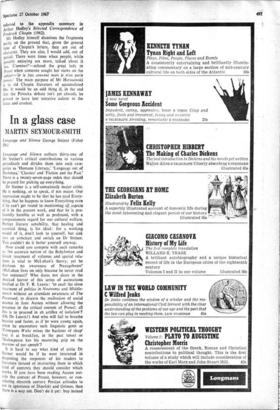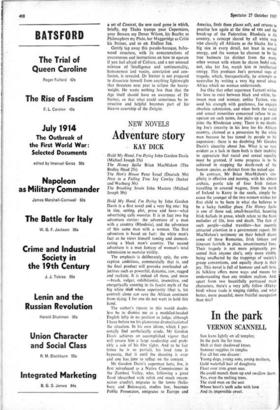In a glass case
MARTIN SEYMOUR-SMITH
Language and Silence collects thirty-one of Dr Steiner's critical contributions to various periodicals and divides them into such cate- gories as 'Humane Literacy,' Language out of Darkness,' 'Classics' and 'Fiction a.nd the Past.' There is a twenty-seven-page index that should be praised for picking up everything, Dr Steiner is a self-consciously major critic. He is nothing, so to speak, if not major. Our impression ought to be that he has read Every- thing, that he happens to know Everything even if he can't get round to mentioning a41,aspects of it in the present work, and that he is pro- foundly humble as well as profound, with a compassionate regard for our cultural welfare. Perfect literary sensibility, that healing and essential thing, is his ideal: for a . working model of it, don't look to yourself, but sink into an armchair and switch on Dr Steiner. You couldn't do it better yourself anyway.
How could you compete with such remarks as 'An accurate notion of the Babylonian and Greek treatment of volumes and spatial rela- tions is vital to McLuhan's theory; yet he discloses no awareness of Neaugebauee (McLuhan lives on only because he never read that sentence)? Who dares not share in the shocked horror of this series of accusations levelled at Dr F. R. Leavis: `to exalt the close treatment of politics in Nostromo and Middle- march without an attendant awareness of The Possessed; to discern the realisation of social nuance in Jane Austen without allowing the presence in the critical context of Proust; all this is to proceed in an artifice of isolation'? (Oh Dr Leavisl) And who will fail to breathe heavier and faster, as if he were young again, when he encounters such linguistic gems as Tinnegans Wake mines the bastions of sleep' (say it at breakfast, in the past tense) or 'Shakespeare has his mastering grip on -the marrow of our speech'?
It is bard to say what kind of critic Dr Steiner would be if he were interested in deepening the responses of his readers to literature instead of instructing them in which kind of contexts they should consider which works. If you have been reading Austen out- side the context of Proust, however, or con- sidering eleventh century Persian attitudes to sex in ignorance of Dipolski and Grimes, then there is a way out. Don't do it yet: buy instead a set of Context, the new card game in which, briefly, my Thales trumps your Copernicus, your Bowers my Dover Wilson, his Beatles as Philosophers my Plato, her Muggeridge as Critic his Steiner, and so on. Endless fun.
Gently tap away this pseudo-baroque, balsa- wood structure, with its concatenations of awarenesses and instructions on how to operate if you feel afraid of Culture, and a not unusual mixture of intelligence and sentimentality, humaneness and vanity, conviction and con- fusion, is revealed. Dr Steiner is not prepared to dissociate himself from anything lightweight that threatens next year to eclipse the heavy- weight. He wants nothing less than that the Age itself should have an awareness of Dr Steiner, so that what could sometimes be in- structive and helpful becomes part of his. bizarre courtship of the Zeitgist.











































 Previous page
Previous page